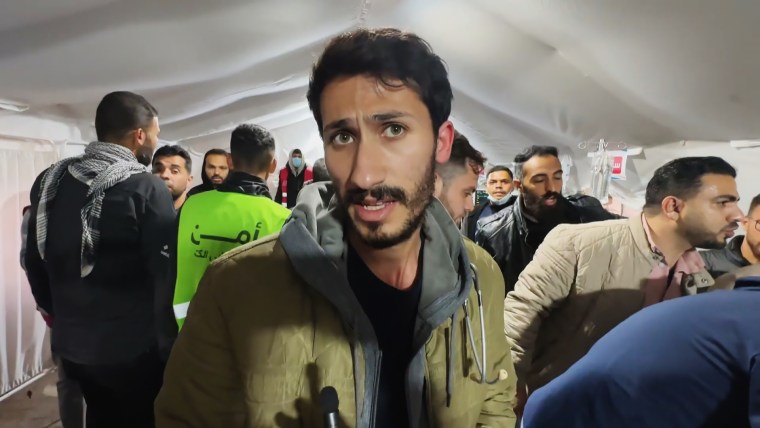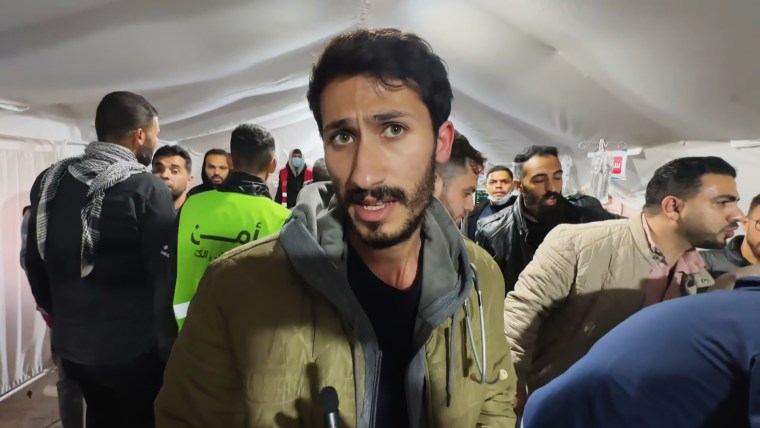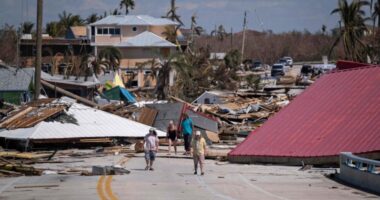Israeli soldiers stormed Nasser Hospital overnight, forcing patients and staff to evacuate the last major functional medical facility in southern Gaza.
Dr. Mohammad Harara, whom NBC News has been following at Nasser since December, joined an estimated 1 million displaced Gazans crammed in the southern border town of Rafah. But throughout the violence and upheaval Thursday, he continued to treat the sick and the wounded.
Video shot Thursday shows Harara helping pull a patient in a dark hoodie from a car, holding the young man’s head gently but firmly as the crew races him into a noisy and crowded tented field hospital.
“Mohammed, wake up! Wake up!” Harara repeatedly shouts as the young man is rushed into the hospital amid frantic activity. The doctor calls out for a stethoscope as he pats the chest of the unconscious figure.
Eventually the patient groans.
“You’re OK,” Harara says, as the sounds of cries, moans and beeping monitors fill the crowded tent.
For weeks, Harara was one of five doctors who remained at the beleaguered Nasser Hospital caring for some 850 patients. NBC News has spent dozens of hours with Harara as he does his rounds in wards brimming with patients, recording how he copes with the gravely injured, the grief-stricken and the terrified — all while surrounded by soldiers, tanks and fighting.
Harara said some of his colleagues were arrested after the Israeli army ordered Nasser Hospital in Khan Younis to evacuate. Some of the patients had to be moved by car, “because we don’t have ambulances to take them to another hospital.”
Other patients, too weak and ill to move, were left behind, he said.
Before working in Nasser, Harara was at Gaza City’s Al-Shifa Hospital in the enclave’s north. In November, it too was stormed by Israeli troops, provoking international shock and alarm.
In both hospitals, doctors and patients told of severe shortages of food, water and medication; of amputations and childbirth performed without anesthesia and painkillers.
The Israel Defense Forces confirmed that its special forces raided Nasser Hospital, which thousands of displaced Palestinians had sought shelter in.

IDF spokesperson Daniel Hagari told NBC News that it had “credible intelligence from a number of sources, including from released hostages, indicating that Hamas held hostages at the Nasser Hospital,” in Khan Younis.
The “sensitive operation was prepared with precision and is being conducted by IDF special forces who underwent specified training,” he said, without specifying what that training was.
Dr. Ashraf Al-Qudra, a spokesperson for Gaza’s Health Ministry, said that Israeli forces had targeted the facility’s ambulance headquarters and tents housing displaced people on the site. He added that intensive care patients were being kept without medical staff inside the hospital.
Doctors Without Borders warned in a statement that the situation at Nasser Hospital was quickly deteriorating, with one of its workers detained and another unaccounted for.
“Our staff reported a chaotic situation, with an undetermined number of people killed and injured,” it said, adding that some of its staff had been forced to flee Nasser Hospital, “leaving patients behind.”
Meanwhile, fears for displaced Gazans sheltering in Rafah are mounting over an expected Israeli ground assault.
But although conditions in the border town, which has roughly quadrupled in population since the start of the war, are dire, Harara did experience a rare crisis-free moment later on Thursday.
In a refugee camp on one of Gaza’s beaches, he flashed a rare smile when he was reunited with his parents and brother after over a month without contact.
“They are still alive,” he said simply.
Harara’s brother, Karim, beamed as he went to hug the doctor.
“My God, my brother” Karim exclaimed.
Harara also caught up with his mother, Fadwa, who gave him a playful slap on the chest before hugging him, her eyes welling up with tears.
“Oh, my beloved,” she said to her son as someone demanded he be brought a chair.
Smiling family members buzzed around Harara, coming in and out of the tents that now hold all their possessions.
With the winter sun shinning brightly and a chilly breeze ruffling aquamarine Mediterranean waters just beyond the camp’s edge, the family soon got down to sharing a meal — traditional bread with lentils and ruby red tomatoes.
“I’m very happy to see the sea now,” Harara said, adding it’s been a long time since he’s seen Gaza’s shores. “I’ve decided to go swimming now,” he joked.
Source: | This article originally belongs to Nbcnews.com










